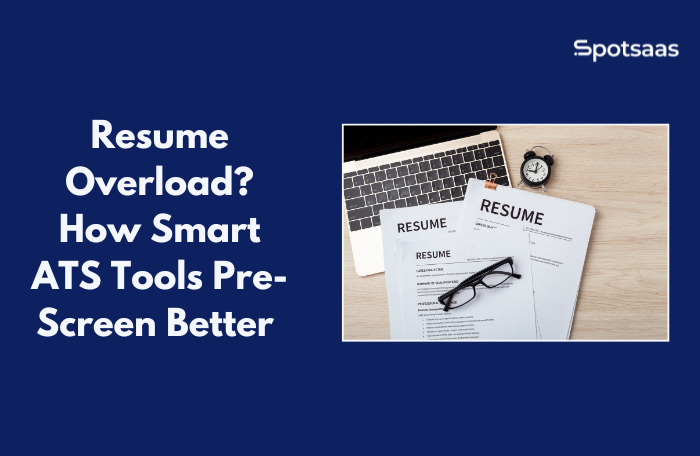Resume pre-screening has become essential in 2025, as hiring teams face a surge in applications per job post. With hundreds of resumes coming in within days, manual screening slows hiring and strains HR teams.
Smart ATS tools now use AI to pre-screen candidates—automating resume analysis, improving match accuracy, and speeding up shortlisting. For teams focused on hiring efficiently and at scale, these platforms offer a clear edge.
What This Blog Includes
If you’re exploring resume screening tools or looking to upgrade your hiring process in 2025, this guide will help you make an informed decision. Here’s what you’ll find:
- A clear explanation of resume pre-screening and how it fits into modern hiring workflows
- An overview of smart ATS platforms and the AI features that improve screening speed and accuracy
- A breakdown of the core benefits of using automated screening tools
- Insights into the key challenges these platforms help solve
- A curated list of the top resume screening tools in 2025, including Ashby, Greenhouse, Recruitee, Manatal, and Lever
- A detailed buying checklist to help you choose the right platform for your needs
- Short, helpful answers to common questions about AI-based screening tools
Whether you’re part of a small HR team or scaling hiring across multiple regions, this guide is designed to support your decision-making process with practical, up-to-date insights.
What Is Smart Resume Pre-Screening?
Smart resume pre-screening is the modern way to filter and evaluate job applications—quickly, accurately, and hire at scale. It combines the basics of resume screening with the power of automation and AI.
📝 What Is Smart Resume Pre-Screening?
- AI filters resumes for basic qualifications
- Speeds up screening for high-volume roles
- Reduces manual review effort
⚙️ How Smart ATS Tools Help
- Parses skills and experience automatically
- Matches applicants to job descriptions
- Ranks candidates by relevance
Here’s how it works and why it matters:
- Resume pre-screening is the first step in hiring where resumes are reviewed to see if candidates meet the basic qualifications.
- In high-volume hiring, manually going through hundreds of resumes can be slow and lead to missed opportunities.
- Traditional methods relied on human judgment or keyword matching, which often produced inconsistent results.
This is where a smart ATS (Applicant Tracking System) comes in:
- It stores resumes, tracks candidate progress, and adds an AI-powered ATS.
- These systems can automatically:
- Parse resume content to pull out key skills and experience
- Match candidates to job requirements
- Rank or score applicants based on relevance
- This means recruiters spend less time sorting and more time interviewing the right people.
In short, smart pre-screening tools help hiring teams work faster, stay organized, and make better decisions, especially when dealing with large applicant pools.
Core Features of Smart Pre-Screening Tools
| Feature | What It Does | Why It Matters |
|---|---|---|
| AI Resume Parsing | Automatically extracts skills, experience, and other key info from resumes | Reduces manual effort and ensures consistency in data capture |
| Candidate Ranking | Scores and ranks applicants based on job relevance and match quality | Helps recruiters prioritize top-fit candidates quickly |
| Knockout Questions | Filters out applicants who don’t meet essential criteria | Saves time by removing unqualified resumes early |
| Skill-Based Matching | Compares candidate profiles to job descriptions using skill mapping | Improves accuracy of shortlists and reduces mismatches |
| Bias-Free Evaluation Options | Allows blind screening modes by hiding personal identifiers | Promotes fairer hiring practices and more equitable outcomes |
Benefits of Smart Resume Screening
For companies managing high applicant volumes or scaling their hiring processes, smart resume screening tools bring clear, measurable advantages:
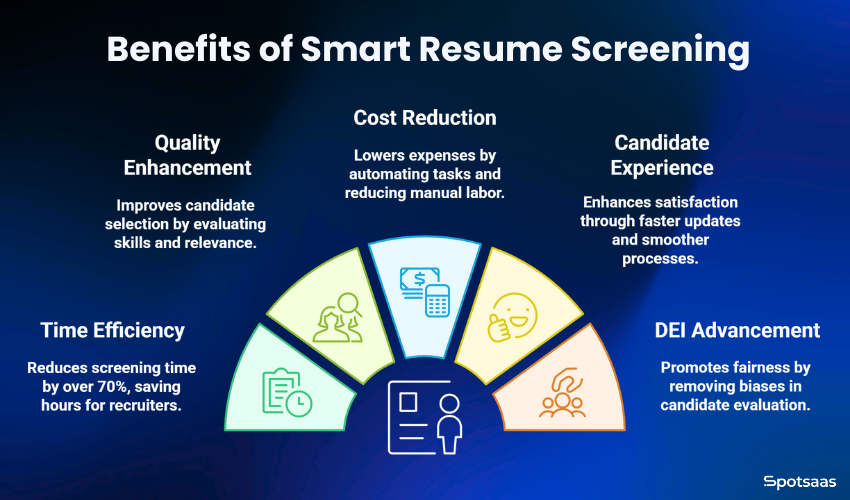
- Cuts Screening Time by Over 70%
Smart tools automate everything from application to offer, starting with resume filtering to help recruiters skip repetitive tasks and focus on top candidates. This end-to-end automation cuts time-to-screen from hours to minutes, which is especially valuable in high-volume hiring. - Enhances the Quality of Shortlists
AI evaluates resumes using context, not just keywords. Factoring in skills, experience, and role relevance surfaces better-aligned candidates, giving internal HRs or hiring managers a more focused pool of candidates to interview. - Lowers Cost-per-Hire
Reducing the manual workload helps companies reduce recruiting costs. Teams spend fewer hours on resume reviews, need less third-party support, and fill positions faster without compromising on hire quality. - Improves Candidate Experience with Faster Turnaround
Automated screening shortens hiring process delays. Candidates receive faster updates, leading to a smoother experience and stronger employer brand perception. - Advances in DEI (Diversity, Equity, Inclusion) Practices
Features like blind screening remove identifiers such as names and universities, ensuring that applicants are evaluated based on merit. This leads to more equitable shortlisting and stronger DEI outcomes.
Key Challenges These Tools Solve
As hiring demands grow, smart ATS platforms help recruiters and talent teams overcome the most pressing challenges in resume screening. Here’s how they make a difference:
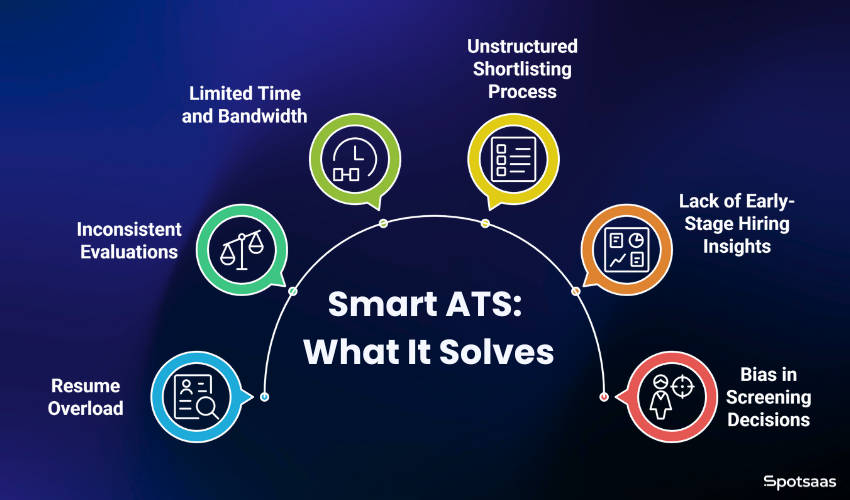
- Resume Overload
Sorting through hundreds of applications manually can take days and often results in strong candidates being missed. Innovative screening tools instantly scan, sort, and surface relevant profiles, giving hiring teams a clear starting point without the guesswork. - Inconsistent Evaluations
Different recruiters may interpret resumes in different ways. These tools apply a consistent set of rules—based on skills, experience, and role criteria—so that every applicant is evaluated fairly and objectively, no matter who is reviewing. - Limited Time and Bandwidth
In fast-paced environments, recruiters are expected to fill roles quickly while juggling multiple openings. Automated pre-screening frees up hours per week by reducing manual sorting, allowing teams to focus on deeper evaluations and candidate engagement. - Unstructured Shortlisting Process
Without a defined framework, resume review can become subjective or disorganized. Smart ATS tools provide scoring systems, filters, and workflows that bring structure and clarity to the way candidates are screened. - Lack of Early-Stage Hiring Insights
Traditional resume reviews don’t leave a trail of data. Modern platforms offer dashboards and reports that help identify trends, like drop-off points or recurring qualification gaps, so teams can refine their job descriptions or outreach strategy. - Bias in Screening Decisions
When resumes include photos, names, or demographic hints, it can unintentionally sway decisions. Smart platforms offer blind screening modes that hide identifying details, making the evaluation process more equitable from the start.
Top Tools to Consider in 2025
These platforms are built to handle high-volume applications, offer intelligent screening, and support scalable hiring processes:
Ashby

Ashby
- Spot Score – 8
- Best For: High-growth startups and scaling teams seeking AI-powered automation
- Pricing: Starts from $360/month
Ashby is a modern recruiting platform built for fast-growing teams that need to move quickly without compromising quality. From AI-assisted application review to customizable hiring workflows and detailed analytics, Ashby empowers hiring teams to streamline the entire process, from sourcing to scheduling.
It’s particularly well-suited for remote-first companies that rely on collaborative tools and efficient screening to manage a high volume of applicants.
Key Features
| Feature | What It Helps With |
|---|---|
| AI-Assisted Application Review | Streamlines the screening process by highlighting top candidates based on predefined criteria. |
| Customizable Workflows | Allows teams to tailor the recruitment process to fit their unique hiring needs. |
| Advanced Analytics | Provides insights into hiring metrics to inform strategic decisions. |
| Integrated Scheduling | Facilitates interview coordination with calendar integrations and timezone support. |
| Collaborative Tools | Enables team collaboration through shared notes, feedback, and role-based access. |
Pricing
Ashby Pricing offers the following pricing plan
- Foundations Plan – Starts at $360/month for up to 10 employees.
- Plus Plan – Custom pricing for 101–1000 employees.
- Enterprise Plan – Custom pricing for organizations with over 1000 employees.
Pricing is based on company size, usage, and commitment, with discounts available for annual commitments.
Pros & Cons
| Pros | Cons |
|---|---|
|
|
Recruitee
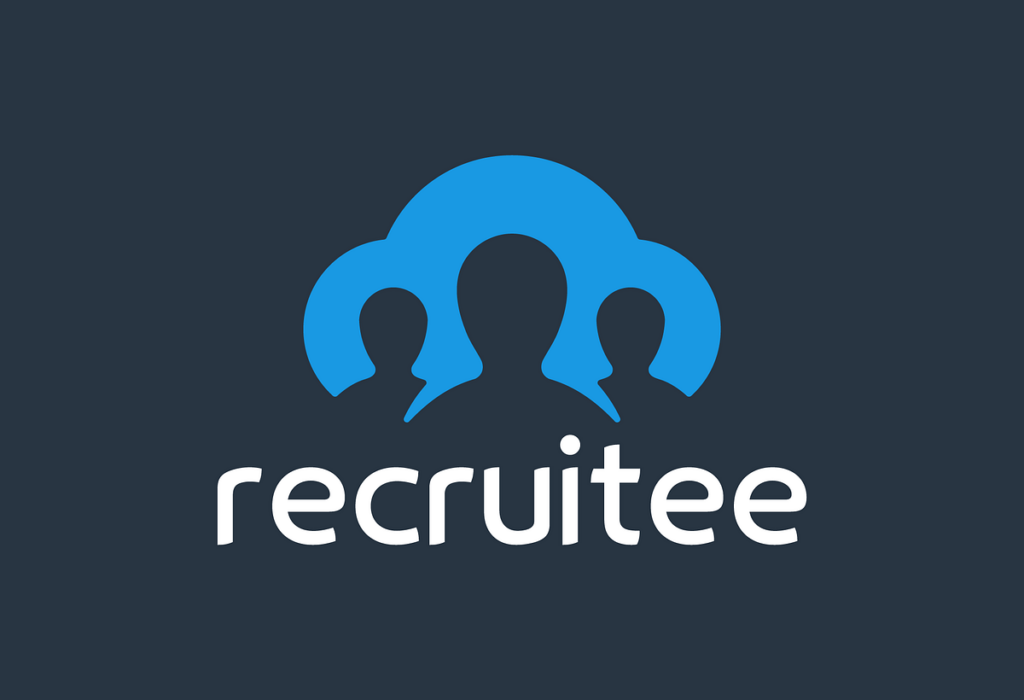
Recruitee
- Spot Score 9.3
- Best For: Collaborative hiring teams and growing businesses
- Pricing: Starts from 270/month
Recruitee makes collaborative hiring easy with its intuitive interface and real-time tools for feedback, evaluations, and interview coordination. Teams can create job-specific workflows, share notes, and automate repetitive tasks—all in one place. Its flexibility makes it a great fit for growing companies with dynamic team structures.
Key Features
| Feature | What It Helps With |
|---|---|
| Custom Hiring Pipelines | Visualize and control each hiring stage for different roles and teams. |
| Role-Based Access | Control what each team member sees and contributes in the hiring process. |
| Collaborative Tools | Share notes, assign tasks, and collect structured feedback across teams. |
| Automated Scheduling | Let candidates schedule interviews based on availability, with timezone support. |
| Multi-Channel Job Posting | Post jobs to multiple boards and manage responses in one central dashboard. |
Pricing
Recruitee pricing offers the following plans
- Start Plan – Starts at $270/month (billed annually), ideal for smaller teams
- Grow Plan – Starts at $343/month, includes advanced analytics, workflows, and custom roles
- Optimize Plan – Custom pricing for enterprises with high-volume hiring needs
Free Trial
18-day free trial with access to core features and integrations.
Pros & Cons
| Pros | Cons |
|---|---|
|
|
Manatal
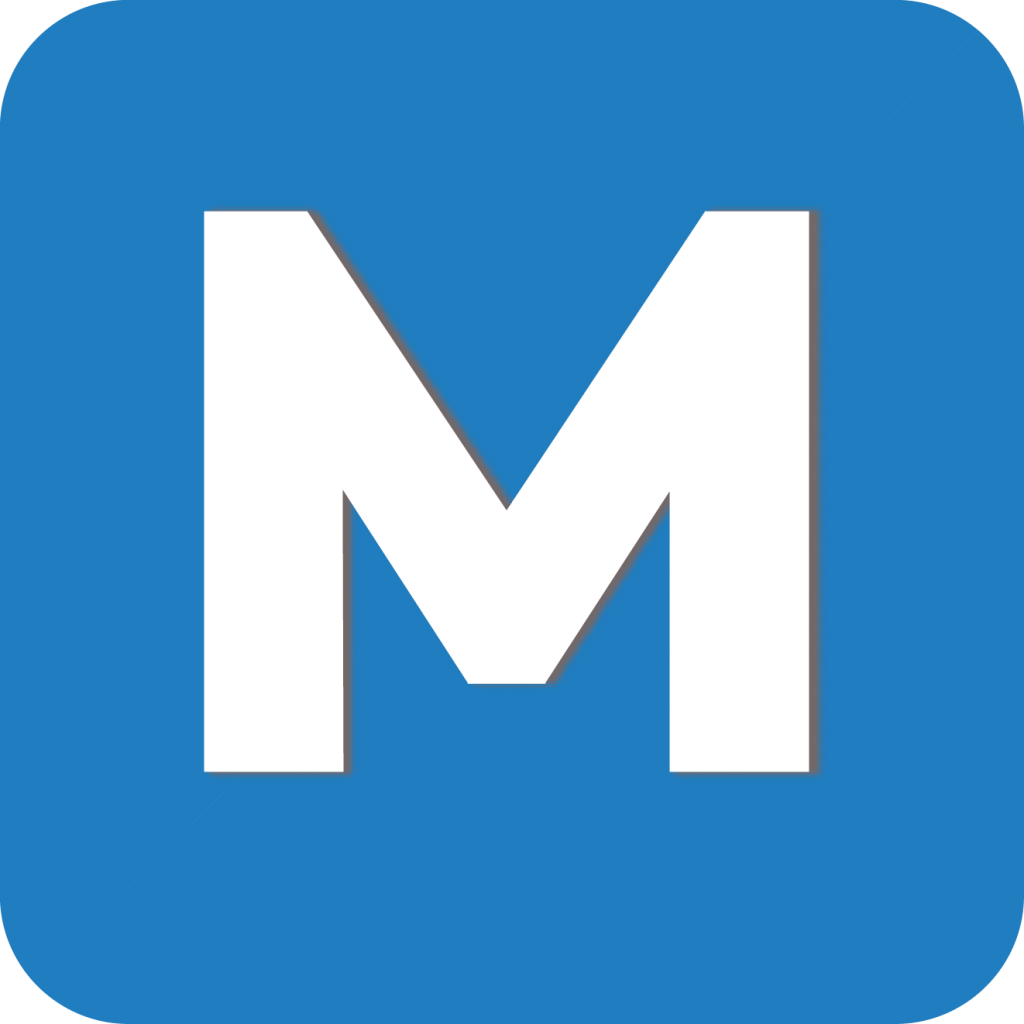
Manatal
- Spot Score: 9.2
- Pricing: Starts at $15/user/month
- Best For: Small to Mid Business
Manatal delivers strong AI capabilities in a lightweight, budget-friendly package. It offers resume parsing, candidate scoring, and LinkedIn profile enrichment, making it a solid fit for recruitment agencies or lean HR teams. It also supports job board distribution and CRM-style tracking, helping teams keep tabs on both candidates and clients.
Key Features
| Feature | What It Helps With |
|---|---|
| AI Candidate Scoring | Automatically ranks candidates based on job fit. |
| Customizable Pipelines | Tailors recruitment stages to specific workflows. |
| Social Media Enrichment | Enhances profiles with data from LinkedIn and other platforms. |
| Resume Parsing | Extracts and organizes resume information efficiently. |
| Job Board Integration | Posts openings to multiple job boards simultaneously. |
| Email & Calendar Sync | Integrates with Gmail and Outlook for seamless communication. |
| Reporting & Analytics | Provides insights into recruitment metrics and KPIs. |
Pricing
Manatal pricing offers several pricing tiers:
- Professional Plan: $15/user/month (billed annually)
- Enterprise Plan: $35/user/month (billed annually)
- Enterprise Plus: $55/user/month (billed annually)
- Custom Plan: Tailored features and pricing upon request
Free Trial
A 14-day free trial is available, allowing users to explore features without commitment.
Pros & Cons
| Pros | Cons |
|---|---|
|
– AI-driven candidate recommendations – User-friendly interface with customization options – Affordable pricing for small to mid-sized businesses – Comprehensive analytics and reporting tools |
– Limited advanced customization in lower-tier plans – Some integrations may require additional setup – Reporting features may not meet all advanced needs |
Lever
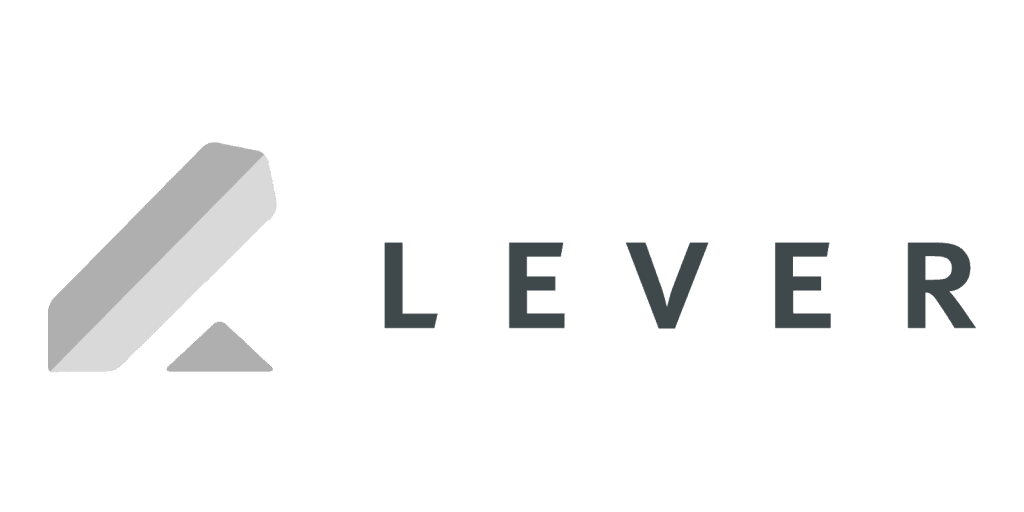
Lever blends ATS and CRM features to support both active hiring and passive talent nurturing. Its AI-based resume scoring, pipeline visualization, and candidate engagement tools make it a strong option for companies that hire frequently or want to build a strategic talent network. It’s also known for clean UX and excellent analytics.
Key Features
| Feature | What It Helps With |
|---|---|
| ATS + CRM in One | Track applicants and manage ongoing candidate relationships. |
| Automated Hiring Stages | Move candidates through custom pipelines with less manual work. |
| Built-in Analytics | Monitor recruiter activity, time-to-hire, and conversion trends. |
| Interview Coordination | Schedule across calendars without back-and-forth emails. |
| Pipeline Customization | Create workflows by role, department, or location. |
| DEI Support Tools | Structure hiring processes to promote fair evaluations. |
| App Integrations | Connect with other HR tools to create a seamless stack. |
Pricing
Lever pricing offers customization pricing based on team size, features needed, and hiring volume. Plans typically include cross-functional hiring like ATS+CRM with optional add-ons.
Free Trial
You can request a guided demo to see how Lever supports high-volume recruiting scenarios.
Pros & Cons
| Pros | Cons |
|---|---|
|
– Combines recruiting and pipeline nurturing – Easy to use and organize workflows – Strong reporting for hiring visibility – Integrates well with HR and scheduling tools |
– Custom pricing requires a demo – Learning curve for CRM features – May need configuration to match complex needs |
Greenhouse

Greenhouse is known for its structured hiring approach, offering customizable scorecards, blind screening features, and robust reporting tools. It’s ideal for companies that want every hiring stage—from sourcing to offer—to follow a repeatable, transparent process. Teams can set up consistent evaluation criteria to reduce bias and improve decision-making.
Key Features
| Feature | What It Helps With |
|---|---|
| Structured Hiring Flows | Creates a consistent interview process across all roles and departments. |
| Recruitment Analytics | Delivers insights on pipeline health, time-to-hire, and team activity. |
| Third-Party Integrations | Connects with HR, assessment, and onboarding tools to centralize your hiring stack. |
| Diversity Support Tools | Provides built-in features to help teams hire inclusively and remove bias. |
| Candidate Management CRM | Helps keep in touch with talent even before a role opens up. |
Pricing
Greenhouse pricing offers tiered pricing plans that scale with your hiring volume and feature needs:
- Essential Plan: Includes core ATS functionality for growing teams
- Advanced Plan: Adds deeper reporting, automation, and more integrations
- Expert Plan: Ideal for large teams with security, compliance, and onboarding needs
Final pricing is customized based on company size and selected tools.
Free Trial
Greenhouse does not offer a free trial. However, companies can request a demo to understand features and evaluate how the platform fits their hiring process.
Pros & Cons
| Pros | Cons |
|---|---|
|
|
How to Choose the Right Tool
With dozens of ATS platforms offering AI-driven resume screening, making the right choice can feel overwhelming. But if you focus on the hiring problems you’re trying to solve—and match them to platform strengths—you’ll quickly find the right fit to boost hiring efficiency and outcomes. Here’s a more in-depth checklist to help guide your selection:
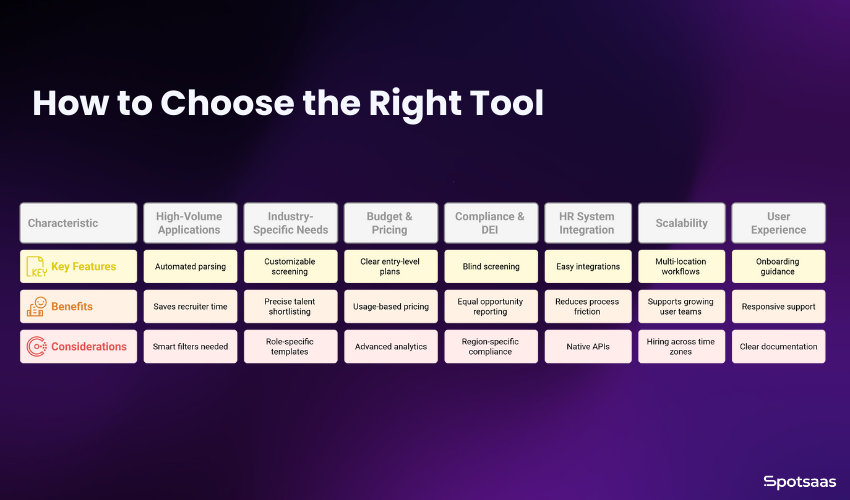
Volume of Applications per Role
Some companies receive 30 applications per role, others receive 300. If you’re on the higher end, your chosen tool should offer automated parsing, bulk candidate actions, and smart filters that help recruiters move quickly without missing qualified applicants. Tools with customizable workflows and batch processing can be a major time-saver.
Industry-Specific Needs
Hiring for technical roles often requires different filters and integrations (e.g., GitHub, Stack Overflow profiles) than hiring for retail or hospitality. Platforms that let you customize screening questions, build role-specific templates, or integrate with job-specific assessments offer more precision in shortlisting the right talent.
Budget and Pricing Flexibility
Not all platforms are priced the same. Some offer flat monthly rates, while others scale by team size or number of active job postings. If you’re a tech startup or growing business, look for tools that offer clear entry-level plans, free trials, or usage-based pricing without long-term commitments. Enterprise buyers may need advanced analytics and integrations, which may be available only in higher tiers.
Compliance and DEI Support
If you operate across regions or have DEI goals in place, it’s important to choose a platform with features like blind screening, equal opportunity reporting, and region-specific compliance support. Platforms with DEI AI capabilities can help identify bias patterns, promote fairer evaluations, and support more inclusive hiring. Tools that offer audit trails and role-based access controls also strengthen both internal transparency and external compliance.
Integration with Existing HR Systems
A smart resume screening tool should work well with the tools you already use. Whether it’s your HRIS, background check software, scheduling tool, or Slack for team collaboration, easy integrations save your team time and reduce process friction. Bonus if the tool includes native APIs or Zapier support for custom workflows.
Scalability for Future Growth
Even if your hiring volume is manageable today, it might not stay that way. Choose your ATS that can scale with your business, supporting multi-location workflows, hiring across time zones, and growing user teams as you expand.
User Experience and Onboarding Support
A tool might be powerful, but it also needs to be easy for your team to use. Prioritize platforms that offer onboarding guidance, clear documentation, and responsive support so you can roll out the system confidently and get the most value from it right away.
Conclusion
In 2025, resume screening no longer needs to be slow, inconsistent, or overwhelming. Innovative ATS tools bring structure, speed, and accuracy to the early stages of hiring, helping teams identify the right candidates faster and more fairly.
Whether you’re scaling a startup or managing enterprise-level recruitment, these platforms simplify decision-making, reduce manual effort, and improve overall hiring outcomes. The right tool saves time, enhances candidate experience, and supports long-term hiring goals.
Choosing the right solution today sets the foundation for more efficient, confident hiring tomorrow. Browse our detailed software listings for real user reviews, pricing breakdowns, and key features.
Explore Top-Rated ATS Tools on SpotSaaS
Not sure which one suits your workflow?
Schedule a free consultation with our software advisors and get personalized recommendations for your agency.
Frequently Asked Questions
What is smart resume screening?
It’s an AI-powered process that filters, ranks, and shortlists candidates based on role fit.
Can smart ATS tools reduce hiring time?
Yes, they automate early-stage screening, significantly cutting down time-to-hire.
Do these tools help with diversity hiring?
Many platforms offer blind screening and standardized evaluations to support DEI efforts.
Are smart screening tools suitable for small teams?
Absolutely—most tools offer flexible plans and intuitive interfaces for small or growing teams.
Do I need technical skills to use a smart ATS?
No, they’re designed for ease of use with simple setup, automation, and built-in support.


